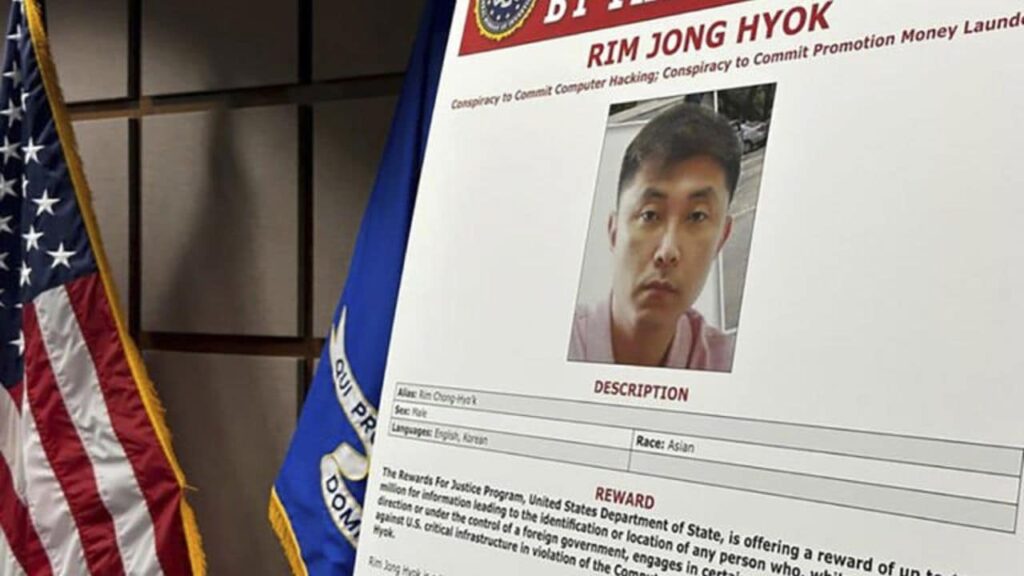North Korean hacking, cyberattacks, US hospitals ransomware, NASA breach, military base cyberattacks, Rim Jong Hyok, Andariel Unit, Reconnaissance General Bureau, cybersecurity, international cybercrime
A North Korean military intelligence operative has been indicted for orchestrating cyberattacks on US hospitals, NASA, and military bases. Rim Jong Hyok, part of the Andariel Unit, is accused of stealing sensitive information, installing ransomware, and laundering money through Chinese banks to fund further attacks. Learn more about the extensive impact of these cybercrimes and the international efforts to combat them.

North Korean Charged in Cyberattacks on US Hospitals, NASA, and Military Bases
In a significant legal development, federal prosecutors in Kansas City, Kansas, have announced the indictment of a North Korean military intelligence operative, Rim Jong Hyok. The charges, brought by a grand jury, allege that Rim engaged in a widespread conspiracy to hack into American healthcare providers, NASA, U.S. military bases, and various international entities. This indictment is part of a broader effort to hold accountable those who perpetrate cybercrimes against critical infrastructure in the United States and around the world.
The Alleged Cybercrime Activities
Rim Jong Hyok, a member of the Andariel Unit of North Korea’s Reconnaissance General Bureau, is accused of orchestrating cyberattacks that disrupted the operations of hospitals and other healthcare providers in the United States. These attacks severely affected the treatment of patients by encrypting files and servers, thereby blocking access to essential medical records, laboratory test results, and computers needed for hospital equipment.
The indictment specifies that Rim targeted 17 entities across 11 U.S. states, including prominent institutions like NASA and various U.S. military bases. His cyber operations extended beyond the United States, impacting defense and energy companies in China, Taiwan, and South Korea.
Breaching NASA and Military Bases
For over three months, Rim and his associates had unauthorized access to NASA’s computer systems, extracting more than 17 gigabytes of unclassified data. This breach included sensitive information related to fighter aircraft, missile defense systems, satellite communications, and radar systems. The hackers also infiltrated computer systems at defense companies in Michigan and California, as well as Randolph Air Force Base in Texas and Robins Air Force Base in Georgia. The malware used in these attacks allowed the Andariel group to send stolen information back to North Korean military intelligence, advancing the country’s military and nuclear capabilities.
Laundering Money through Chinese Banks
The indictment further accuses Rim of laundering the money obtained from these cyberattacks through a Chinese bank. The laundered funds were then used to purchase computer servers and finance additional cyber operations targeting defense, technology, and government entities worldwide. The complex financial transactions involved transferring Bitcoin to virtual currency addresses, converting it into Chinese currency, and eventually accessing the money from ATMs near the Sino-Korean Friendship Bridge, which connects China and North Korea.
The Impact and Implications of the Cyberattacks
The cyberattacks on American hospitals had a profound impact on patient care. In May 2021, a Kansas medical center was hit by hackers who encrypted its files and servers, blocking access to crucial patient information and laboratory results. The attackers demanded a Bitcoin ransom of approximately $100,000, threatening to publish the hospital’s data online if their demands were not met. Similar attacks affected a healthcare provider in Colorado, using the same Maui ransomware variant.
Financial Tracing and Seizures
Federal investigators managed to trace the ransom payments through blockchain transactions. An unnamed co-conspirator transferred the Bitcoin to virtual currency addresses belonging to two Hong Kong residents before it was converted into Chinese currency and transferred to a Chinese bank. In 2022, the Justice Department announced that the FBI had seized approximately $500,000 in ransom payments from the money laundering accounts, including the entire ransom payment from the Kansas hospital.
Legal and Strategic Outcomes
While the arrest of Rim Jong Hyok remains unlikely, the indictment serves several strategic purposes. It highlights the persistent threat posed by North Korean cyber operations and provides a basis for potential sanctions against North Korea. According to Allan Liska, a cybersecurity analyst with Recorded Future, these sanctions could cripple North Korea’s ability to collect ransoms, thereby reducing the motivation for such cyberattacks. However, Liska also warned that these measures might push North Korea to engage in more cryptocurrency theft.
International Reactions and Future Prospects
The involvement of Chinese entities and the targeting of Chinese companies in these cyberattacks raise important questions about China’s response. As an ally of North Korea, China’s reaction to being a victim of these attacks could influence the geopolitical dynamics in the region. Liska noted that China might not be pleased about being targeted, which could impact its support for North Korea.
Broader Context of North Korean Cyber Operations
This indictment is part of a broader pattern of North Korean cyber activities aimed at circumventing international sanctions and funding the country’s political and military ambitions. In 2021, the U.S. Justice Department charged three North Korean computer programmers for a range of cybercrimes, including a destructive attack on an American movie studio and the attempted theft of over $1.3 billion from banks and companies worldwide.
The current indictment of Rim Jong Hyok adds to this growing body of evidence against North Korea’s state-sponsored cyber activities. It underscores the sophisticated and global nature of these operations, which often involve complex financial transactions and collaborations with foreign entities.
Conclusion
The indictment of Rim Jong Hyok marks a significant step in the fight against international cybercrime. It exposes the extensive and malicious cyber operations conducted by North Korea’s Reconnaissance General Bureau, targeting critical infrastructure and stealing sensitive information. By detailing the financial and logistical support for these operations, the indictment underscores the sophisticated nature of North Korean cyber activities.
While the immediate arrest of Rim Jong Hyok remains unlikely, the indictment sets the stage for potential sanctions and international cooperation to curb North Korea’s cybercrimes. As the global community continues to grapple with the challenges posed by state-sponsored cyber operations, this case serves as a stark reminder of the importance of robust cybersecurity measures and the need for vigilant, coordinated responses to emerging threats.
The Justice Department’s actions against Rim and his associates highlight the ongoing efforts to hold cybercriminals accountable, regardless of their location. The indictment not only aims to bring justice to the victims of these cyberattacks but also seeks to deter future incidents by disrupting the financial and operational capabilities of the perpetrators.
Read More
- FAA and Union Agree on New Rest Rules for Air-Traffic Controllers to Address Fatigue and Safety
- Melania Trump Makes Rare Public Appearance at RNC Amidst Personal Turmoil and Recent Shooting Incident
- Will Taylor Swift Attend the 2024 Paris Olympics? Analyzing the Possibilities
- Gavin Newsoms Potential Presidential Bid: Support for Harris and His Rising National Profile
